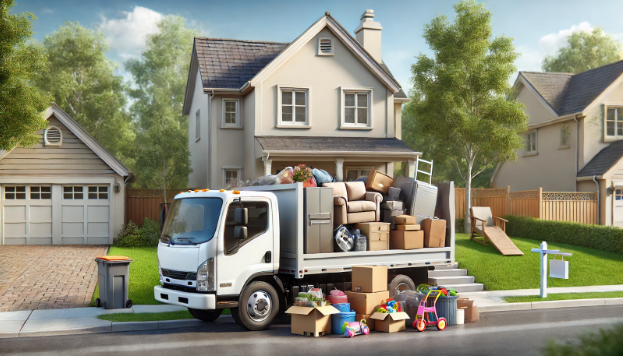
Household Junk Disposal: How to Declutter Your Home Responsibly
Whether you’re spring cleaning, moving, or just looking to create a more organized space, household junk disposal can make a world of difference. With the right approach, clearing out unwanted items doesn’t have to be overwhelming or wasteful. This guide will walk you through the most efficient and responsible ways to handle household junk disposal, covering everything from affordable options to eco-friendly disposal practices.
Why Household Junk Disposal Matters
Decluttering your home isn’t just about aesthetics; it has real benefits that can enhance your day-to-day life. Here’s why proper household junk disposal is worth the effort:
- Boosts Mental Clarity: Clearing out junk creates a more relaxing and organized environment, reducing stress.
- Frees Up Space: More space allows for easier organization and functionality within your home.
- Eco-Friendly: Responsible disposal methods like recycling and donation prevent unnecessary waste and support a sustainable lifestyle.
- Safety: Removing large or broken items reduces tripping hazards and can prevent injuries.
Affordable Household Junk Disposal Options
Disposing of junk doesn’t have to break the bank. Here are some budget-friendly options to consider:
- Curbside Pickup: Many municipalities offer free bulk item pickups, especially for larger items like furniture.
- Community Donation Events: Some areas hold community donation drives or yard sales, allowing residents to donate or sell unwanted items.
- DIY Transport to Recycling Centers: If you have access to a vehicle, transporting items to local recycling centers is an affordable way to dispose of junk.
- Junk Removal Service Discounts: Some companies offer discounts for bulk pickups or seasonal promotions, so keep an eye out for special deals.
Common Types of Household Junk and How to Dispose of Them
Household junk covers a wide range of items, each requiring specific disposal methods to maximize convenience and
eco-friendliness. Here’s a look at common types of household junk and the best ways to dispose of them:
| Type of Household Junk | Examples | Recommended Disposal Methods |
|---|---|---|
| Furniture | Couches, tables, beds | Donation, recycling centers, junk removal services |
| Appliances | Refrigerators, microwaves, washers | Recycling facilities, donation if functional |
| Electronics (E-Waste) | Computers, TVs, phones | E-waste recycling programs |
| Clothing and Textiles | Clothes, linens, towels | Donation, textile recycling |
| Paper and Cardboard | Old papers, magazines, cardboard boxes | Curbside recycling, composting |
| Yard Waste | Leaves, branches, soil | Composting, yard waste collection |
| Miscellaneous Junk | Toys, decor, small household items | Donation, recycling, junk removal |
1. Furniture Disposal
Furniture, from sofas to old chairs, is one of the most common types of household junk. There are a few effective ways to handle unwanted furniture:
- Donate: Many charities accept gently used furniture, giving it a second life. Organizations like Habitat for Humanity’s ReStore can resell donated items to fund community projects.
- Recycling Centers: If the furniture is broken, many centers accept wood, metal, and upholstery for recycling.
- Junk Removal Services: If you’re dealing with large or heavy items, a junk removal service can handle the loading and disposal for you.
Tip: Repurpose Before Disposal
Consider whether any pieces can be repurposed. With a little creativity, an old dresser can become a unique storage piece or a DIY home project.
2. Appliance Disposal
Disposing of large appliances can be tricky, but there are responsible ways to get rid of them:
- Donation: If the appliance still works, donating it to a local charity is a great option. Thrift stores, shelters, and some charities accept functional appliances.
- Recycling: Many appliances can be recycled, particularly those made of metal. Certain recycling centers or junk removal companies offer appliance recycling services.
- Manufacturer Programs: Some companies and retailers accept old appliances for recycling or offer take-back programs for specific items, such as electronics and refrigerators.
3. E-Waste Disposal (Electronics)
Electronics contain hazardous materials, making proper disposal essential. Here’s how to handle e-waste responsibly:
- E-Waste Recycling Programs: Many cities have e-waste centers that accept items like TVs, computers, and phones. Recycling e-waste prevents harmful chemicals from entering the environment.
- Retailer Take-Back Programs: Retailers like Best Buy and Staples offer recycling for electronics, often free of charge.
- Data Wipe: Be sure to erase any personal information from electronics before recycling or donating.
4. Clothing and Textile Disposal
Textile waste is a major environmental issue, but there are ways to dispose of old clothes responsibly:
- Donation: Clothing in good condition can be donated to thrift stores, shelters, and non-profits.
- Textile Recycling Programs: Many cities offer textile recycling programs, accepting clothes that are worn out or no longer usable.
- Repurposing: Old clothes can be repurposed as cleaning rags or DIY projects, reducing waste.
5. Yard Waste Disposal
Yard waste, including branches, leaves, and grass clippings, is easy to dispose of in an eco-friendly way:
- Composting: Composting yard waste is an excellent way to turn organic material into nutrient-rich soil for your garden.
- Yard Waste Collection: Many cities offer curbside yard waste pickup, especially in the fall and spring.
- Drop-Off Sites: Some communities have designated sites for yard waste drop-off, which are then used for city landscaping projects.
Frequently Asked Questions (FAQs) on Household Junk Disposal
Q1: Can I leave furniture on the curb for regular trash pickup?
A1: Most municipalities don’t accept large items like furniture in regular trash pickups. Check with your local waste management to see if they offer bulk item pickups.
Q2: How do I know if an item is recyclable or not?
A2: Common recyclable items include metal, glass, certain plastics, and paper. Electronics, appliances, and hazardous materials should be taken to specialized recycling centers.
Q3: Is it okay to put electronics in the trash?
A3: Electronics contain hazardous materials and should never be thrown in the trash. E-waste centers or retailer take-back programs are the best disposal options.
Q4: Can I compost all yard waste?
A4: Most yard waste can be composted, but avoid adding diseased plants or heavily treated wood as these can contaminate the compost.
